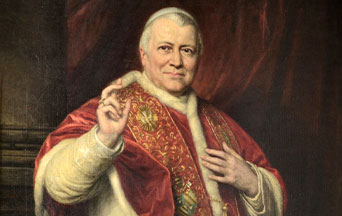
After the peace with Austria, the general amnesty granted to the French Government’s enemies in 1859 canceled the two official warnings l’Univers had received up to that time. It also obliged the newspaper and Louis Veuillot to exercise some caution in combating the Emperor’s revolutionary policy. However, Veuillot knew that the advantage would be short-lived. He would always be the prime target of the government’s wrath. Napoleon III needed to silence, or at least weaken, the only influential voice raised in uncompromising defense of the rights of the Holy See.
Eternal and Natural Law: The Foundation of Morals and Law
Indeed, apart from Veuillot’s Ultramontanes, the various Catholic groups posed no serious problem. Some liberal Catholics openly accepted the Italian revolution. Others opposed it weakly because of the Italian Nationalists’ revolutionary errors. In this matter, many liberal Catholics were closest to the orientation of l’Univers. Their leaders, who called themselves Ultramontanes, had little choice but to defend the pope’s temporal power. But the public was always suspicious. The lilberals’ defense was full of contradictions resulting from their poisonous ideology. It was only a political move, as they all equivocated in the strength of their opposition to the Empire.
In this light, a letter from Henri, Count of Lacordaire, to Charles, Count of Montalembert, is illustrative. Montalembert had criticized Lacordaire for not defending the Holy See. Lacordaire’s reply is very useful in clearly explaining the contradictory situation.
 Learn All About the Prophecies of Our Lady of Good Success About Our Times
Learn All About the Prophecies of Our Lady of Good Success About Our Times
“Under the present circumstances, nothing is easier than stirring up anger and writing incendiary pages with tumultuous eloquence. Suffice it to consider only one aspect of the question: the papacy’s temporal dominions being threatened cruelly and odiously. But on the other hand, you have a people subjected to servitude for half a century by a detestable power that Count de Maistre declared the enemy of humanity. You have the princes and peoples of Europe’s vain requests that the States of the Holy See be reformed. Finally, you have the question of the Holy See’s moral guidance [sic] in world affairs, summed up in recent times by the Univers and Civiltà Catolica.
“I neither want nor can be solidary with all this. I am for the Holy See against its oppressors. I believe in the moral necessity of its temporal dominion. I regret the evils it endures and would give the last drop of my blood for it. But at the same time, I desire the liberation of Italy, severe changes to the government of the Roman States, and even more profound changes in the general direction of the Church’s affairs. I imagine this is your opinion, or you are no longer the same one I knew.
“In the present matter, what you call my honor thrills me little; duty is what matters to me, and I will fulfill it as well as I can without hoping to satisfy either you, Rome, its friends, or its enemies.”
Veuillot’s dire predictions were soon confirmed. France and Austria made peace in July 1859. On October 11, l’Univers received its first warning when the government charged that an article by Veuillot, titled “Europe in Asia,” insulted and slandered the government.
That article was truly prophetic. It criticized how France and England sent an expedition to force China to reopen its doors to the West. Veuillot exposed the fact that Europe conducted a policy detrimental to its interests. On the one hand, Europe favored revolution in Christian countries and allowed revolutionary excesses to weaken them. On the other, the same nations intervened in Asia carelessly and brutally, all the while turning a blind eye to Russia’s growing influence in the East.
10 Razones Por las Cuales el “Matrimonio” Homosexual es Dañino y tiene que Ser Desaprobado
“The time will come and is approaching when Russia reigns over the banks of the Yellow Sea to the Bosphorus. Mistress of innumerable hordes and all science secrets, she will be civilized enough to perfect them and sufficiently barbaric to use them without scruples. She will then unveil her pretensions to dominate and possess Europe. What can Europe do at that point? Corroded with impiety, lost in revolution and internal dissent, she has no leaders or insecure leaders ready to betray her and is willing to betray herself because all leads her to worship force.
“We are worried about the banditry dominating Italy; this is our big issue! We want to know who will get its duchies and how the Lombards will steal or be forced to return the papal territories they seized during Pepin the Brief, which France forced them to return with its noble sword. While we focus on this drama, so glorious to spectators, other territorial questions will touch us more closely, in which Italian nationhood will be of little use to itself and us. For their survival, let European nations turn their eyes to Asian skies, ever more charged with lightning. It is high time!”
More than a century later, we can see how right Louis Veuillot was. Under Soviet rule, his prophecy, which might have seemed chimerical in 1859, tragically came true. But at the time, the government could not justify the warning made to l’Univers because it seemed chimerical. The warning was shocking, and it fooled no one. The government wanted to punish the newspaper that effectively opposed its Italian policy. There could no longer be any doubt: l’Univers must let Napoleon III quietly help the Italian revolutionaries, or the government would suppress Veuillot’s newspaper.

